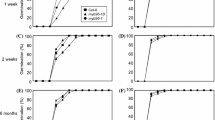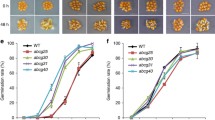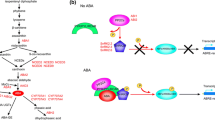Abstract
The role of maternally derived abscisic acid (ABA) during seed development has been studied using ABA-deficient mutants of Nicotiana plumbaginifolia Viviani. ABA deficiency induced seed abortion, resulting in reduced seed yield, and delayed growth of the remaining embryos. Mutant grafting onto wild-type stocks and reciprocal crosses indicated that maternal ABA, synthesized in maternal vegetative tissues and translocated to the seed, promoted early seed development and growth. Moreover ABA deficiency delayed both seed coat pigmentation and capsule dehiscence. Mutant grafting did not restore these phenotypes, indicating that ABA synthesized in the seed coat and capsule envelope may have a positive effect on capsule and testa maturation. Together these results shed light on the positive role of maternal ABA during N. plumbaginifolia seed development.





Similar content being viewed by others
Abbreviations
- ABA :
-
Abscisic acid
- DAP :
-
Days after pollination
- g :
-
Grafted
- Wt :
-
Wild-type
References
Alonso-Blanco C, Blankestijn-De Vries H, Hanhart CJ, Koornneef K (1999) Natural allelic variation at seed size loci in relation to other life history traits of Arabidopsis thaliana. Proc Natl Acad Sci USA 96:4710–4717
Audran C, Borel C, Frey A, Sotta B, Meyer C, Simmoneau T, Marion-Poll A (1998) Expression studies of the zeaxanthin epoxidase gene in Nicotiana plumbaginifolia. Plant Physiol 118:1021–1028
Bittner F, Oreb M, Mendel RR (2001) ABA3 is a molybdenum cofactor sulfurase required for activation of aldehyde oxidase and xanthine dehydrogenase in Arabidopsis thaliana. J Biol Chem 276:40381–40384
Borisjuk L, Rolletschek H, Wobus U, Weber H (2003) Differentiation of legume cotyledons as related to metabolic gradients and assimilate transport into seeds. J Exp Bot 54:503–512
Cheng WH, Endo A, Zhou L, Penney J, Chen HC, Arroyo A, Leon P, Nambara E, Asami T, Seo M, Koshiba T, Sheen J (2002) A unique short-chain dehydrogenase/reductase in Arabidopsis glucose signaling and abscisic acid biosynthesis and functions. Plant Cell 14:2723–2743
Duckham SC, Lindforth RST, Taylor IB (1991) Abscisic acid-deficient mutants at the aba gene locus of Arabidopsis thaliana are impaired in the epoxidation of zeaxanthin. Plant Cell Environ 14:601–606
Frey A, Audran C, Marin E, Sotta B, Marion-Poll A (1999) Engineering seed dormancy by the modification of zeaxanthin epoxidase gene expression. Plant Mol Biol 39:1267–1274
Hattori T, Vasil V, Rosenkrans L, Hannah LC, McCarty DR, Vasil IK (1992) The Viviparous-1 gene and abscisic acid activate the C1 regulatory gene for anthocyanin biosynthesis during seed maturation in maize. Genes Dev 6:609–618
Hilhorst HWM, Downie B (1995) Primary dormancy in tomato (Lycopersicon esculentum cv. Moneymaker): studies with the sitiens mutant. J Exp Bot 47:89–97
Karssen CM, Brinkhorst-Van der Swan DLC, Breekland AD, Koornneef M (1983) Induction of seed dormancy during seed development by endogenous abscisic acid: studies on abscisic acid-deficient genotypes of Arabidopsis thaliana L. Heynh. Planta 157:158–165
Koornneef M, Hanhart CJ, Hilhorst HWM, Karssen CM (1989) In vivo inhibition of seed development and reserve protein accumulation in recombinants of abscisic acid biosynthesis and responsiveness mutants in Arabidopsis thaliana. Plant Physiol 90:463–469
Kraepiel Y, Rousselin P, Sotta B, Kerhoas L, Einhorn J, Caboche M, Miginiac E (1994) Analysis of phytochrome- and ABA-deficient mutants suggests that ABA degradation is controlled by light in Nicotiana plumbaginifolia. Plant J 6:665–672
Marin E, Marion-Poll A (1997) Tomato flacca mutant is impaired in ABA aldehyde oxidase and xanthine dehydrogenase activities. Plant Physiol Biochem 35:369–372
Marin E, Nussaume L, Quesada A, Gonneau M, Sotta B, Hugueney P, Frey A, Marion-Poll A (1996) Molecular identification of zeaxanthin epoxidase of Nicotiana plumbaginifolia, a gene involved in abscisic acid biosynthesis and corresponding to the ABA locus of Arabidopsis thaliana. EMBO J 15:2331–2342
Nambara E, Marion-Poll A (2003) ABA action and interactions in seeds. Trends Plant Sci 8:195–244
Meurs C, Basra AS, Karssen CM, van Loon LC (1992) Role of abscisic acid in the induction of desiccation tolerance in developing seeds of Arabidopsis thaliana. Plant Physiol 98:1484–1493
Phillips J, Artsaenko O, Fiedler U, Horstmann C, Mock HP, Müntz K, Conrad U (1997) Seed-specific immunomodulation of abscisic acid activity induces a developmental switch. EMBO J 16:4489–4496
Raz V, Bergervoet JHW, Koornneef M (2001) Sequential steps for developmental arrest in Arabidopsis seeds. Development 128:243–252
Rock CD, Quatrano RS (1995) The role of hormones during seed development. In: Davies PJ (eds) Plant hormones. Kluwer, Dordrecht, pp 671–697
Rock CD, Zeevaart JAD (1991) The aba mutant of Arabidopsis thaliana is impaired in epoxy-carotenoid biosynthesis. Proc Natl Acad Sci USA 88:7496–7499
Sagi M, Scazzocchio C, Fluhr R (2002) The absence of molybdenum cofactor sulfuration is the primary cause of the flacca phenotype in tomato plants. Plant J 31:305–317
Schwartz SH, Léon-Kloosterziel KM, Koornneef M, Zeevaart JAD (1997) Biochemical characterization of the aba2 and aba3 mutants in Arabidopsis thaliana. Plant Physiol 114:161–166
Schwartz SH, Qin X, Zeevaart JAD (2003) Elucidation of the indirect pathway of abscisic acid biosynthesis by mutants, genes, and enzymes. Plant Physiol 131:1591–1601
Senger S, Mock HP, Conrad U, Manteuffel R (2001) Immunomodulation of ABA function affects early events in somatic embryo development. Plant Cell Rep 20:112–120
Seo M, Koshiba T (2002) Complex regulation of ABA biosynthesis in plants. Trends Plant Sci 7:41–48
Tan BC, Joseph LM, Deng WT, Liu L, Li QB, Cline K, McCarty DR (2003) Molecular characterization of the Arabidopsis 9-cis epoxycarotenoid dioxygenase gene family. Plant J 35:44–56
Xiong L, Ishitani M, Lee H, Zhu KJ (2001) The Arabidopsis LOS5/ABA3 locus encodes a molybdenum cofactor sulfurase and modulates cold stress- and osmotic stress-responsive gene expression. Plant Cell 13:2063–2083
Acknowledgements
We thank Helen North and Isabelle Debeaujon for their critical reading of the manuscript. We also thank Krystyna Gofron and Michel Lebrusq for technical assistance with plant culture.
Author information
Authors and Affiliations
Corresponding author
Rights and permissions
About this article
Cite this article
Frey, A., Godin, B., Bonnet, M. et al. Maternal synthesis of abscisic acid controls seed development and yield in Nicotiana plumbaginifolia . Planta 218, 958–964 (2004). https://doi.org/10.1007/s00425-003-1180-7
Received:
Accepted:
Published:
Issue Date:
DOI: https://doi.org/10.1007/s00425-003-1180-7




